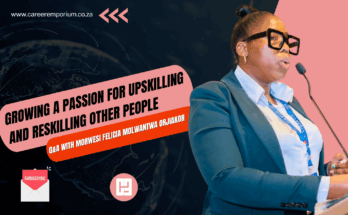Sometimes as a law graduate you have this dream of one day becoming admitted or even becoming an advocate. The reality is, that does not always happen due to many reasons. Does that mean you wasted your time with your law degree? Khwezi Xaba says no, and provides some insights on how you can capitalize on your law degree without going the “obvious route”. Here is a Q&A with her.
Sibusiso Nkosi: Before we get to alternative careers for law graduates, what are some of the “obvious” careers for Law graduates? Please explain them.
Khwezi Xaba: As a law student the most obvious and frequent careers we are told we can go into is being an attorney or an advocate (either in private law practice, for the state or in a public interest firm). Once you have your legal qualification, and you work within the law ambit, you are considered a lawyer. An attorney is the lawyer that the clients brief. To become an attorney, you must write board exams, attend practical vocational training, and serve your articles of clerkship for a period of 24 months (or 12 months subject to having attended full time practical vocational training). Once you have completed the requirements, you will then apply to the High Court to be admitted as an Attorney of the High Court of South Africa.
An advocate, on the other hand, is a lawyer that specialises in court appearances and does not brief the client directly- but is rather briefed by the attorney. To become an advocate, you are required to serve one year of Pupillage under the guidance of an advocate and write the Bar Exam. You will then be admitted in the Roll of Advocates. It is also important to note that advocates are independent practitioners who are self-employed (unlike attorneys who can be in a firm of attorneys).
The eventual career progress for the abovementioned routes would be to become a law firm Partner, Senior Counsel, a Magistrate, or a Judge.
Sibusiso Nkosi: Sometimes we see graduates not quite making it into these “obvious” career paths. What could be the reason? Is it experience or certifications? What is the issue?
Khwezi Xaba: The truth is, the legal profession is highly oversaturated with law graduates, and the law firms that can offer practical legal training cannot accommodate the number of graduates. It also doesn’t aid the matter that there is huge unemployment crisis in this country. As a result of the greater supply than the demand, employers can pick “cream of the crop” students (either top achiever students or students who have participated in extracurricular activities). There are also other barriers such as language requirements and vehicle requirements for the graduates, and this results in certain groups of graduates being marginalised. Another challenge is the financial barrier. During articles and Pupillage, you receive either no or low remuneration for the 1- 2-year period. During your training contract, you are also required to attend court or consultations outside of the office, which give rise to greater expenses for the candidate. This proves to be financially strenuous to most candidates, and impractical to pursue these routes.
Sibusiso Nkosi: If graduates do not make it into the “obvious” career paths, what else is out there for them? What are the alternatives?
Khwezi Xaba: That’s the beauty of a law degree- there is so much opportunity! A lawyer is required to problem solve in literally all industries. You can become a Legal Advisor (the in- house lawyers of corporations and government institutions and provide advice on legal matters of the company and act as an internal risk mitigation agent), go into compliance, alternative legal services and legal technology, Human Resources, government, politics, academia and research, forensics to list but a few.
I have been fortunate enough to be exposed to various industries. I started my working journey as a Transformation and Change Intern and Transformation Officer where I had the amazing opportunity to work at a JSE listed leading food services franchisor. I was exposed to the BBBEE sector codes, employment equity and the business operations. As an intern, I also took the opportunity to connect with the legal department, and drafted franchise agreements and other contracts and sat in legal review meetings.
I have also worked at an international law firm within the alternative legal services space, which renders legal services for clients using innovative technology- and in effect the legal processes are managed in a cost-effective manner, and the turnaround times for work are faster- especially when processing bulk information.
I am currently in the fiduciary services sector at one of the leading investment companies, and what’s amazing is that you get to learn about the business at large, the industry you work in and how your department contributes to the broader business picture.
Sibusiso Nkosi: In your opinion, is it still worth it for people to pursue a law degree?
Khwezi Xaba: Definitely. You have to be determined with what you want, and you cannot allow the potential roadblocks to stagger your path. I believe that in life, you cannot inherit people’s problems. Who is to say that you won’t obtain the role you want in your legal career?
One of the greatest pieces of advice I have received was from the HR executive from one of my previous employers. They said that the road to success will not always be a linear path. You must be willing to go backwards to go forwards sometimes. I also cannot emphasize the importance of networking. The relationships that you build and how you present your brand can be the difference between you being unemployed and employed, you getting a promotion and you getting seconded in your job.
Sibusiso Nkosi: What are your last words to a law graduate who feels stuck at this moment?
Khwezi Xaba:
- Apply for the vacation work programmes, job shadowing programmes and participate in the various clubs and societies – all these add to your experience as a student and give you the competitive edge.
- It’s important to keep moving forward. Do not be disheartened by the notorious “we regret to inform you” emails. Your opportunity will eventually find you, as long as you continue applying. It’s okay to start in a different area of work to get to your ultimate goal- I had to pivot many times before I got my admission as an attorney.
- Keep an open mind on what you want to do- you might be surprised at what you end up enjoying that might be totally different to what you thought you wanted. If you are too rigid in following the traditional law path, you might actually miss out on your true calling.
- Don’t be afraid to reach out to people in your area of interest. Often, people are more than amenable to impart some wisdom- whether it’s a single LinkedIn message or a mentorship arrangement.
- Lastly, do not forget: your career is in your hands!
If you found value in this Q&A, please do not forget to drop a like!
Do not forget to subscribe to our newsletter to have any new article sent to you directly! Sign up for free.




